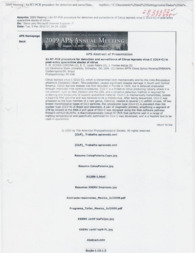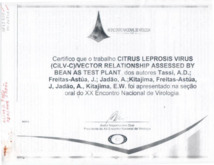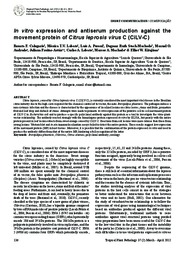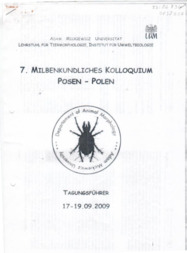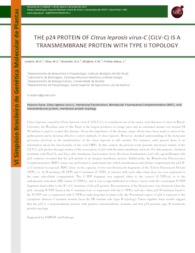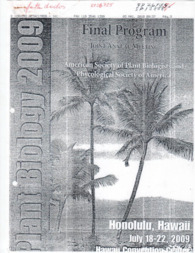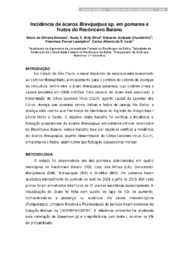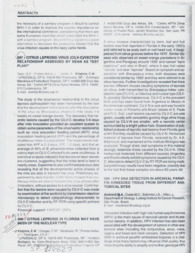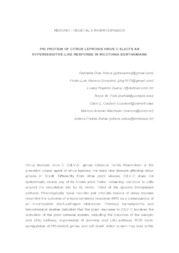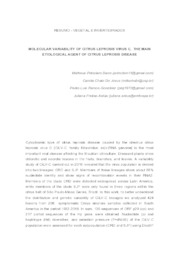Search Publications
Filter by:
| Author(s): OCHOA-CORONA, F. M.; LOCALI-FABRIS, E. C.; FREITAS-ASTÚA, J. Citrus leprosis virus C (CiLV-C), which is transmitted both mechanically and by the mite Brevipalpus phoenicis (Geijskes) (Acari: Tenuipalpidae), causes significant disease damage in South and Central... ... |
| Author(s): TASSI, A. D.; FREITAS-ASTÚA, J.; JADÃO, A.; KITAJIMA, E. W. The study of the virus/vector relationship in the citrus leprosis pathosystem has been hampered by the fact that the development of the lesions after the inoculation of the virus by Brevipalpus phoeni... ... |
| Author(s): CALEGARIO, R. F.; LABATE, M. T. V.; PERONI, LUÍS A.; STACH-MACHADO, D. R.; ASTUA, J. de F.; LABATE, C. A.; MACHADO, M. A.; KITAJIMA, E. W. Citrus leprosis, caused by Citrus leprosis virus C (CiLV-C), is currently considered the most important viral disease in the Brazilian citrus industry due to the high costs required for the chemical c... ... |
| Author(s): KITAJIMA, E. W.; CALEGARIO, R. F.; FREITAS-ASTUA, J.; ALBERTI, G. Electron microscopic (EM) examination of Brevipalpus phoenicis (Acari: Tenuipalpidae) colonizing Citrus leprosis virus, cytoplasmic type (CiLV-C)-infected sweet orange plants permitted the detection o... ... |
| Author(s): KUBO, K. S.; STUART, R. M.; BASTIANEL, M.; COSTA, F. N.; FREITAS-ASTÚA, J.; MACHADO, M. A. Citrus leprosis is transmitted by the tenuipalpidae mite Brevipalpus phoenicis, causing chlorotic local lesions in leaves, fruits and stems of susceptible hosts. The control of the vector in Brazil co... ... |
| Author(s): ALMEIDA, D. de O.; SILVA, S. X. B.; CHUMBINHO, E. A.; LARANJEIRA, F. F.; LEDO, C. A. da S. No Estado de São Paulo, o maior dispêndio de recursos está relacionado ao controle fitossanitário, principalmente para o controle de vetores de doenças da citricultura, dentre eles, o ácaro Brevipalpu... ... |
| Author(s): KITAJIMA, E. W.; CHAGAS, C. M.; HARAKAWA, R.; FREITAS-ASTÚA, J.; RODRIGUES, J. C. V. A citrus disease characterized by stem, leaf and fruit lesions was first reported in Florida in the early 1900's and referred to as scaly bark or nail head rust. It disappeared from citrus grooves bef... ... |
| Author(s): ARENA, G. D.; RAMOS-GONZÁLEZ, P. L.; ROGERIO, L. A.; FALK, B. W.; CASTEEL, C. L.; MACHADO, M. A.; ASTUA, J. de F. Citrus leprosis virus C (CiLV-C, genus Cilevirus, family Kitaviridae) is the prevalent causal agent of citrus leprosis, the main viral disease affecting citrus groves in Brazil. [...]. |
| Author(s): BARRO, M. P.; JESUS, C. C. DE; RAMOS-GONZÁLEZ, P. L.; ASTUA, J. de F. Cytoplasmic type of citrus leprosis disease caused by the cilevirus citrus leprosis virus C [CiLV-C; family Kitaviridae; ss(+)RNA genome] is the most important viral disease affecting the Brazilian ci... ... |
Observation
Some of Embrapa's publications are published as ePub files. To read them, use or download one of the following free software options to your computer or mobile device. Android: Google Play Books; IOS: iBooks; Windows and Linux: Calibre.
Access other publications
Access the Agricultural Research Database (BDPA) to consult Embrapa's full library collection and records.
Visit Embrapa Bookstore to purchase books and other publications sold by Embrapa.

